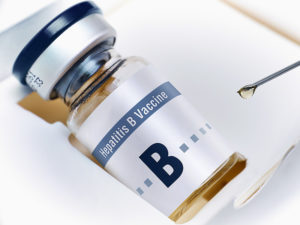by David J. Weber, MD, MPH
In 2017 the FDA approved Heplisav-B (HepB-CpG), a yeast-derived vaccine prepared with a novel adjuvant, administered as a 2-dose series (0, 1 month) for use in persons aged ≥18 years. This vaccine was recommended for use in all adults by the Centers for Disease Control/Advisory Committee on Immunizations in February 2018. Importantly, seroprotective antibody to hepatitis B surface antigen (anti-HBs) levels were achieved in 90.0%–100.0% of subjects receiving HepB-CpG (Dynavax Technologies Corporation), compared with 70.5%–90.2% of subjects receiving Engerix-B (GlaxoSmithKline Biologicals). The frequency and type of adverse event is similar to existing hepatitis B vaccines. The improved efficacy and safety of HebB-CpG has been determined in four randomized controlled trials assessing prevention of HBV infection and six randomized controlled trials assessing adverse events in adults. Based on analysis of these studies, the CDC stated that “the benefits of protection with 2 doses administered over 1 month make HepB-CpG an important option for prevention of HBV.”
Committee on Immunizations in February 2018. Importantly, seroprotective antibody to hepatitis B surface antigen (anti-HBs) levels were achieved in 90.0%–100.0% of subjects receiving HepB-CpG (Dynavax Technologies Corporation), compared with 70.5%–90.2% of subjects receiving Engerix-B (GlaxoSmithKline Biologicals). The frequency and type of adverse event is similar to existing hepatitis B vaccines. The improved efficacy and safety of HebB-CpG has been determined in four randomized controlled trials assessing prevention of HBV infection and six randomized controlled trials assessing adverse events in adults. Based on analysis of these studies, the CDC stated that “the benefits of protection with 2 doses administered over 1 month make HepB-CpG an important option for prevention of HBV.”
Vaccination is the primary means for preventing hepatitis B virus (HBV) infection and its complications. Existing hepatitis B (HepB) vaccines use an aluminum adjuvant. HepB-CpG contains yeast-derived recombinant HepB surface antigen (HBsAg) and is prepared by combining purified HBsAg with small synthetic immunostimulatory cytidine-phosphate-guanosine oligodeoxynucleotide (CpGODN) motifs (1018 adjuvant). The 1018 adjuvant binds to Toll-like receptor 9 to stimulate a directed immune response to HBsAg.
HepB-CpG is administered as 2 doses, 1 month apart. HepB-CpG is available in single-dose 0.5 mL vials. Each dose contains 20 μg of HBsAg and 3,000 μg of 1018 adjuvant. HepB-CpG is formulated without preservatives and is administered as an intramuscular injection in the deltoid region of the upper arm. Persons being immunized against hepatitis B should receive a complete series of the same vaccine. HepB-CpG may be used in adults for the following indications: 1) Persons at risk for infection by percutaneous or mucosal exposure to blood (e.g., HCP, dialysis patients); 2) Persons at risk for infection through sexual exposure (e.g., men who have sex with men); 3) International travelers to countries with high or intermediate levels of endemic HBV infection (HBsAg prevalence ≥2%); 4) Persons with liver disease (e.g., hepatitis C); 5) HIV infected persons; 6) Incarcerated persons; and, 7) Other persons seeking protection from hepatitis B virus infection (even without acknowledgment of a specific risk factor).
The advantages of HepB-CpG for immunization of HCP include the improved dosing schedule (i.e., 2 vs 3 doses) and immunogenicity (i.e., higher seroprotection rate). The only disadvantage for use of HepB-CpG is a slightly higher cost for the entire vaccine series. UNC Hospitals has placed HepB-CpG on formulary and listed HepB-CpG as the preferred hepatitis B vaccine for adults. Before administering
HepB-CpG, health care providers should consult the package insert for precautions, warnings, and contraindications.
Schillie S, et al. Recommendations of the Advisory Committee on Immunization Practices for
Use of a Hepatitis B Vaccine with a Novel Adjuvant. MMWR 2018;67:455-458.